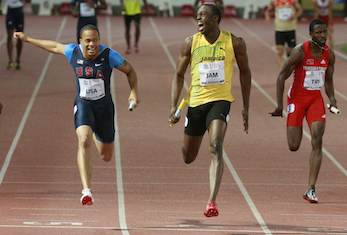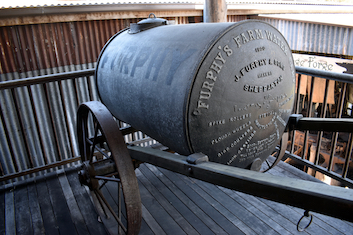
Usain Bolt, the fastest of all, crosses the finish line for Jamaica in the men’s 100-metre relay
Adjectives have an interesting feature: we can compare many of them, and then use these comparisons to compare nouns.
- Trinidad and Tobago had a fast team in the men’s relay. The USA had a faster team. Jamaica, with Usain Bolt, had the fastest team of all.
The different forms of the adjective fast (faster, fastest) allow use to compare the speed of the different teams. Descriptive adjectives are the only adjectives that can be compared in this way. The different comparisons are called the degrees of comparison. There are three degrees of comparison.
- positive: the original form of the adjective
- comparative: used when the comparison is with one other thing
- superlative: used when the comparison is with two or more things.
A comparative adjective is made in two ways:
- by adding –er to the positive form of the adjective, when the adjective is one or two, or sometimes three, syllables long
- by using the word (an adverb) more in front of the adjective, when it is two or more syllables long.
A superlative adjective is made in two ways:
- by adding –est to the positive form of the adjective, when the adjective is one or two, or sometimes three, syllables long
- by using the word (an adverb) most in front of the adjective, when the adjective is two or more syllables long.
You will notice that there is no division on when you should add –er (or –est) or when you should use more (or most). Very few words of three syllables add –er and –est; unhappier, unhappiest, unhealthier and unhealthiest are among the exceptions. On the other hand, two-syllable adjectives that end in –er tend to use more and most: more eager, most sober. For some adjectives, you can use either method:
- Shall I compare thee to a summer’s day? No, thou art more lovely and more temperate (Shakespeare)
- Love is lovelier the second time around (Sammy Cahn)
Don’t worry too much if you are unsure about whether to use –er and –est, or more and most; just check in a dictionary.
Misusing superlatives: a common error
There is not much that is complicated about the different degrees of comparison but one common error is to use a superlative when comparing only two things. The superlative should be used for comparison of three or more things.
- Ella is the oldest of the two girls should be Ella is the older of the two girls.
- Asking the girls to stop rather than letting them play is the worst option should be Asking the girls to stop rather than letting them play is the worse option.

Irregular degrees of comparison
The comparative form of good is better; the superlative form of good is best. The comparative form of bad is worse; the superlative form of bad is worst.
Good, better, best/Never let it rest/’Til your good is better/And your better best
(This homily appeared on Furphy water tanks, made in Victoria, from about the start of the nineteenth century. Although the words are sometimes attributed to St Jerome, that seems to be a furphy – and furphy is a word that owes its meaning to the water tanks, used for Australian troops in World War I. Soldiers gathered round the tanks – forerunners of office water-coolers – and the gossip and rumours exchanged became known as furphies . . .) 
Absolute adjectives and modified absolutes
There are some descriptive adjectives that cannot be compared, because they do not have changing degrees of being. These are known as absolute adjectives, and the common error of trying to use a comparative or superlative form of them is known as a modified absolute. Open, shut, pregnant and dead are examples of absolute adjectives.
- The cat looked out the open window. (Correct)
- The cat looked out the most open window. (Incorrect: something cannot be more open than other things; windows, doors and shops are either open or shut.)
 Dead is a similar adjective. Although it is possible to say I dragged my half-dead, weary body down the stairs after my exercise session that is used to indicate that I am exhausted, not that half of me has died. People, animals and plants are either alive (even if they are approaching death), or dead. Nothing can be more dead than something else.
Dead is a similar adjective. Although it is possible to say I dragged my half-dead, weary body down the stairs after my exercise session that is used to indicate that I am exhausted, not that half of me has died. People, animals and plants are either alive (even if they are approaching death), or dead. Nothing can be more dead than something else.  Pregnant is an interesting adjective because how advanced the pregnancy is can be modified by another word:
Pregnant is an interesting adjective because how advanced the pregnancy is can be modified by another word:
- She was heavily pregnant when they left on holiday.
But otherwise a woman is either pregnant, or not; you cannot be more pregnant than someone else.
- The most pregnant woman in the antenatal class went outside. (wrong)
 The adjective that is most often used wrongly in this way is unique: something cannot be more unique than something else, and nothing is most unique. An experience, an event, whatever it is that is being described is either unique, or it is not.
The adjective that is most often used wrongly in this way is unique: something cannot be more unique than something else, and nothing is most unique. An experience, an event, whatever it is that is being described is either unique, or it is not.
- The Mona Lisa is more unique than anything else I have seen. (wrong)
- The Mona Lisa is the most unique painting in the world. (wrong)
- The Mona Lisa is unique. (correct)

The Mona Lisa is unique (never more unique or most unique)

If you have found this post interesting, you can find a full index to my other posts on the index page. To be notified when I post a new topic, follow me on Facebook! If you have any particular questions you’d like me to answer in future posts, just send me a message. I’m always interested to learn what people think, and how you came across this site, so please post a comment.
If you think you would be interested in either my complete grammar course or an individual customised online course (particularly suited for people who don’t live in Melbourne), just click your preferred option.
Photos: Usain Bolt © Grosremy | Dreamstime.com; two little girls playing by Jelleke Vanooteghem on Unsplash; Furphy water cart by Mr Privacy/Shutterstock.com; cat in window by Chris Barbalis on Unsplash; Melbourne General Cemetery by Canley from Wikimedia Commons; pregnant woman by Camylla Battani and Mona Lisa by Eric Terrade, both on Unsplash.